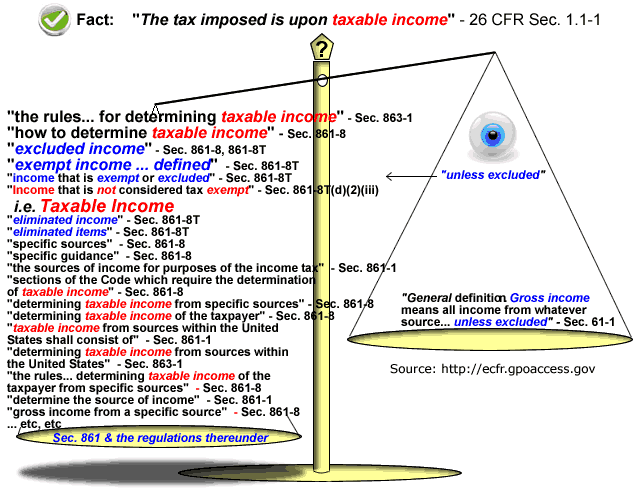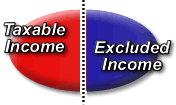| 
"the rules... for determining taxable income" (1 file found)
 These
6 words are found together only once in the entire tax law. You
can confirm this on your own computer. It cannot be confused.
It is written only once & states "the rules"
are written in Sec. 861, as shown by the weight
of evidence above. These
6 words are found together only once in the entire tax law. You
can confirm this on your own computer. It cannot be confused.
It is written only once & states "the rules"
are written in Sec. 861, as shown by the weight
of evidence above.
More search
results

Lawmakers
(i.e. politicians) write statutes which are codified
in the United States Code (26USC). 

 Treasury
Secretary reads and interprets 26USC then
writes regulations
in the Code of Federal Regulations (26CFR). These are
the administrative
laws for citizens & the IRS to follow. Treasury
Secretary reads and interprets 26USC then
writes regulations
in the Code of Federal Regulations (26CFR). These are
the administrative
laws for citizens & the IRS to follow.

According to the IRS
...
...  +
+  = Tax Law
= Tax Law
 "Federal
tax law begins with the Internal Revenue
Code (IRC), enacted by Congress in Title 26 of the United
States Code (26 U.S.C.)." "Federal
tax law begins with the Internal Revenue
Code (IRC), enacted by Congress in Title 26 of the United
States Code (26 U.S.C.)."
- IRS www.irs.gov/taxpros/article/0,,id=98137,00.html
 "Treasury
Regulations (26 C.F.R.)--commonly referred to as Federal
tax regulations-- pick up where the Internal
Revenue Code (IRC) leaves off" "Treasury
Regulations (26 C.F.R.)--commonly referred to as Federal
tax regulations-- pick up where the Internal
Revenue Code (IRC) leaves off"
- IRS www.irs.gov/taxpros/article/0,,id=98137,00.html#26cfr
 26USC + 26CFR = Tax Law
26USC + 26CFR = Tax Law
|  Fact
Fact

All income is "excluded income"
... except taxable income. |

Shut your mouth, Boy! |

According to ...
Title 26
USC Sec 7806, Construction of title
(b) Arrangement and classification
No inference, implication, or presumption
of legislative construction shall be drawn or made
by reason of the location or grouping of any
particular section or provision or portion of this title,
nor shall any table of contents, table of cross references,
or similar outline, analysis, or descriptive matter relating
to the contents of this title be given any legal effect.
 Among
other things, this means... Among
other things, this means...
- Sections or portions of law don't have to be written
together, but in fact, required sections can be located
hundreds of sections apart from each other. (i.e. Sec.
1 "upon taxable income" might require
Sec. 861 "how to determine taxable income")
- Tables, outlines, analysis, descriptions of contents,
have no "legal effect," i.e. only the
words within are law.
 Tax statutes and regulations used in this analysis were
copied directly from the Government Printing Office website.
Tax statutes and regulations used in this analysis were
copied directly from the Government Printing Office website.

"The U.S. Government Printing Office disseminates
official information from all three branches of the Federal Government."
- http://gpoaccess.gov
You can search or download the United States
Code (26USC), & the Code of Federal Regulations (26CFR) at
the following...
 Search
26USC
Search
26USC
 Search 26CFR
Search 26CFR
See How to
Search & more CFR
downloads
As simple as A, B, C, here is what federal tax regulations
say about taxable income ...
Source: eCFR

|
A. "The tax imposed is upon taxable income"
- 26CFR1.1-1
 "how to determine taxable income" - Sec.
861-8
"how to determine taxable income" - Sec.
861-8
|
| |

|
B. "gross income from a specific source
... must first be determined in order to arrive at “taxable
income” - 26CFR1.861-8(a)(4)
 "specific sources" - Sec.
861-8
"specific sources" - Sec.
861-8
|
| |

|
C. "The taxpayer's taxable income from sources within
or without the United States will be determined under the
rules of Secs. 1.861-8 through
1.861-14T for determining taxable income
from sources within the United States." - 26CFR1.863-1(c)
 "excluded income" - Sec.
861-8 & Sec.
861-8T
"excluded income" - Sec.
861-8 & Sec.
861-8T
 "eliminated income" - Sec.
861-8 & Sec.
861-8T
"eliminated income" - Sec.
861-8 & Sec.
861-8T
 "eliminated items" - Sec.
861-8T
"eliminated items" - Sec.
861-8T
 "exempt income ... defined" - Sec.
861-8T
"exempt income ... defined" - Sec.
861-8T 
 "income that is not ... exempt" - Sec.
861-8T i.e. taxable
"income that is not ... exempt" - Sec.
861-8T i.e. taxable 
|
"Terms can have different
meanings when used in law... show me the legal definition."
- Law Professor

26
USC 1
"There is hereby imposed on the taxable income ...
a tax"

Search tax regulations
Search for “taxable
income” (i.e. “taxable income”
- in HTML quotes). Notice


26
USC 63
(a) In general
"the term ``taxable income'' means gross income minus
the deductions allowed by this chapter (other than the standard
deduction)..."
 Search tax regulations
Search tax regulations
Search for “deductions”
(i.e. “deductions” - in HTML). Notice 

26
USC 61
-HEAD-
Sec. 61. Gross income defined
-STATUTE-
(a) General definition
Except as otherwise provided
in this subtitle, gross income means all income from whatever
source derived...

26
CFR 1.61-1
Sec. 1.61-1 Gross income.
"(a) General definition. Gross income means
all income from whatever source derived, unless
excluded by law."
 "Except" what? ... "Unless"
what?
"Except" what? ... "Unless"
what?
26
CFR 1.61-1
"(b) ... common items ... are included
in or excluded from gross income entirely ... To the extent
that another section of the Code or of the regulations thereunder,
provides specific treatment for any item of income,
such other provision shall apply"
 Facts: 1) "common items" are excluded "entirely".
2) Other provisions shall apply.
Facts: 1) "common items" are excluded "entirely".
2) Other provisions shall apply.
Observe both the CFR and USC are
showing:
- "all income from whatever source... unless excluded"
(CFR 61)
- "Except as otherwise provided...
all income from whatever source" (USC 61)
- These are "General definitions" (CFR 61 and
USC 61), so specific definitions or instructions must exist
somewhere in codified form.
- USC 63 says "In general... ``taxable income''
means gross income minus the deductions" (USC 63) i.e.
taxable income = gross income minus deductions
- *Cross references in USC Sec. 61 and USCA Sec. 61 refer
to Section 861. (These are disappearing from new editions)
- Only CFR Sec. 861 prescribes the "rules...
for determining taxable income".
- Sec. 61-1 mentions "gross income" nine times, but
Sec. 861-8 mentions "gross income" over 200 times.
Specific treatment?
- More common items are excluded from gross income entirely...
"The purpose of
these cross references is to direct attention to the more
common items which are included in
or excluded from gross income entirely, or treated
in some special manner. To the extent that another section
of the Code or of the regulations thereunder,
provides specific treatment for any item of income,
such other provision shall apply" - CFR
1.61-1 (b)
*Cross References below
 What "common items" can be "excluded
from gross income entirely"?
What "common items" can be "excluded
from gross income entirely"?
 "gross income enumerated in section 61"
"gross income enumerated in section 61"
26CFR1.861-8(a)(3)
 "Class
of gross income. For purposes of this section, the gross income
to which a specific deduction is definitely related is referred
to as a ``class of gross income'' and may consist
of one or more items (or subdivisions of these items) of gross
income enumerated in section 61" "Class
of gross income. For purposes of this section, the gross income
to which a specific deduction is definitely related is referred
to as a ``class of gross income'' and may consist
of one or more items (or subdivisions of these items) of gross
income enumerated in section 61"
26CFR1.861-8(b)
 "in
a taxable year there may be no item of gross income in a class...
and... gross income may include excluded income." "in
a taxable year there may be no item of gross income in a class...
and... gross income may include excluded income."
Only "gross income means all income",
but all income is not “taxable income”.
 What "specific sources" are taxable? What is
"otherwise provided"?
What "specific sources" are taxable? What is
"otherwise provided"?
26 USC Sec. 61
"(a) General definition
Except as otherwise provided in this subtitle,
gross income means all income from whatever source"
Besides the fact income tax is imposed upon taxable
income, not gross income, this is only a "General definition".
Where are specifics, "as otherwise provided"?
 "specific guidance": (1 file found in Part 1, Income Taxes)
"specific guidance": (1 file found in Part 1, Income Taxes)
26CFR1.861-8
(a) In general--(1) Scope.
 ...
This section provides specific guidance for applying
the cited Code sections by prescribing rules for the allocation
and apportionment of expenses, losses, and other deductions (referred
to collectively in this section as ``deductions'') of the taxpayer.
The rules contained in this section apply in determining taxable
income of the taxpayer ...
This section provides specific guidance for applying
the cited Code sections by prescribing rules for the allocation
and apportionment of expenses, losses, and other deductions (referred
to collectively in this section as ``deductions'') of the taxpayer.
The rules contained in this section apply in determining taxable
income of the taxpayer
 "gross income from a specific source": (1 file found)
"gross income from a specific source": (1 file found)
 26CFR1.861-8 26CFR1.861-8
(a) (4) Statutory grouping of gross income and residual grouping
of gross income. For purposes of this section, the term ``statutory
grouping of gross income'' or ``statutory grouping'' means the
gross income from a specific source or activity which must
first be determined in order to arrive at ``taxable income'' from
which specific source or activity under an operative section.
(See paragraph (f)(1) of this section.) Gross income from
other sources or activities is referred to as the ``residual
grouping of gross income'' or ``residual grouping.''
... In some instances, where the operative section so requires,
the statutory grouping or the residual grouping may include,
or consist entirely of, excluded income. See paragraph
(d)(2) of this section with respect to the allocation
and apportionment of deductions to excluded income.
 "taxable income from specific sources": (1 file found)
"taxable income from specific sources": (1 file found)
 26CFR1.861-8(f)(3)(ii) 26CFR1.861-8(f)(3)(ii)
Relationship of sections 861, 862, 863(a), and 863(b).
Sections 861, 862, 863(a), and 863(b) are the four provisions
applicable in determining taxable income from specific
sources. Each of these four provisions applies
independently.
Business owners may find this interesting...
"determination of source of taxable income": (3 file(s) found)
26CFR1.863-3
(d)
 Determination
of source of taxable income. Once the source of gross income
has been determined under paragraph (c) of this section, the
taxpayer must properly allocate and apportion separately under
Secs. 1.861-8 through 1.861-14T the amounts of
its expenses, losses, and other deductions to its respective amounts
of gross income... Determination
of source of taxable income. Once the source of gross income
has been determined under paragraph (c) of this section, the
taxpayer must properly allocate and apportion separately under
Secs. 1.861-8 through 1.861-14T the amounts of
its expenses, losses, and other deductions to its respective amounts
of gross income...
The taxpayer "must" allocate
deductions under Sec. 861. It's mandatory.
The "specific governs the general".
"gross income from a specific source
... must first be determined in order to arrive at “taxable
income” - 26CFR1.861-8(a)(4)
 "specific sources" (3 matches, in 1 file)
eCFR Title 26
"specific sources" (3 matches, in 1 file)
eCFR Title 26

26CFR1.861-8
(a) In general--(1) Scope.
 ...
The rules contained in this section apply in determining
taxable income of the taxpayer from specific sources
and activities under other sections of the Code, referred
to in this section as operative sections. See paragraph
(f)(1) of this section for a list ...
The rules contained in this section apply in determining
taxable income of the taxpayer from specific sources
and activities under other sections of the Code, referred
to in this section as operative sections. See paragraph
(f)(1) of this section for a list
Cross References
The following Cross
Reference can be found in 26USC Sec. 61 (1994 edition) & 26USCA
Sec. 61 (2002 edition). Note, Cross References are disappearing,
and are no longer being printed in new editions of the USC.
Title 26 USC Sec. 61
Cross references
 Income
from sources- Income
from sources-
Within the United States, see section 861 of this title.
Without the United States, see section 862 of this title.
According to USC Sec. 7806(b), cross references
have no legal effect. They are only tools for the location of
certain subjects. However, the cross reference is itself a law
with its own legal effect.
Note: There are Amendments in Subchapter
N - Notes, and Subchapter N Part I - Notes, which
show SOURCE RULES AND OTHER GENERAL RULES RELATING TO FOREIGN
INCOME used to be titled DETERMINATION OF SOURCES OF INCOME. This
title substitution occurred in 1988.

26
USC 861
 Sec.
861. Income from sources within the United
States Sec.
861. Income from sources within the United
States
(a) Gross income from sources within United States
(b) Taxable income from sources within United States
26
USC 862
Sec. 862. Income from sources without the
United States
(a) Gross income from sources without United States
(b) Taxable income from sources without United States

26CFR1.861-1
Sec. 1.861-1 Income from sources within the United
States.
 (a)
Categories of income. Part I (section 861 and following),
subchapter N, chapter 1 of the Code, and the regulations
thereunder determine the sources of income for purposes
of the income tax... (a)
Categories of income. Part I (section 861 and following),
subchapter N, chapter 1 of the Code, and the regulations
thereunder determine the sources of income for purposes
of the income tax...
(a)(1) Within the United States.
See Secs. 1.861-8 and 1.863-1.
(2) Without the United States.
See Secs. 1.862-1 and 1.863-1.
(3) Partly within and partly without the United States.
See Secs. 1.863-2 to 1.863-5, inclusive.
'Whatever source' must first be separated between within
& without the United States.
If instructions are provided only once they cannot be confused.
According to the code, we must determine our
taxable income, and this requires "the rules... for determining
taxable income".
26CFR1.861-1(b)
 Taxable
income from sources within the United States. The taxable income
from sources within the United States shall consist of the
taxable income described in paragraph (a)(1) of
this section plus the taxable income allocated or apportioned
to such sources, as indicated in paragraph (a)(3)
of this section. Taxable
income from sources within the United States. The taxable income
from sources within the United States shall consist of the
taxable income described in paragraph (a)(1) of
this section plus the taxable income allocated or apportioned
to such sources, as indicated in paragraph (a)(3)
of this section.
Following this regulation points us to two lists.
One list providing sources of taxable income, and the
other list providing items of income that are taxable.
These lists show that only our foreign sources and items
are taxable for a US citizen. First, we see paragraph (a)(1) as
instructed above.
 861-1
paragraph (a)(1) 861-1
paragraph (a)(1)
...taxable income from sources within
the United States... See Secs. 1.861-8 and 1.863-1.
861-1 paragraph (a)(3)
Partly within and partly without the United States. The taxable
income allocated or apportioned to sources within the United States...
shall be determined in accordance with section 863 (a) or (b).
See Secs. 1.863-2 to 1.863-5, inclusive.
26CFR1.863-1
 (c)
Determination of taxable income. The taxpayer's taxable
income from sources within or without the United
States will be determined under the rules
of Secs. 1.861-8 through 1.861-14T for determining
taxable income from sources within the United
States. (c)
Determination of taxable income. The taxpayer's taxable
income from sources within or without the United
States will be determined under the rules
of Secs. 1.861-8 through 1.861-14T for determining
taxable income from sources within the United
States.
If we follow any of the previous references, they all lead to
CFR Sec. 861-8. The regulations are based on the USC "in accordance
with section 863 (a) or (b)." So, next we examine 861-8.
"how to determine taxable income"

26CFR1.861-8
 "Sec.
1.861-8 Computation of taxable income from sources
within the United States and from other sources
and activities. "Sec.
1.861-8 Computation of taxable income from sources
within the United States and from other sources
and activities.
(a) In general--(1) Scope.
...how to determine taxable income of a taxpayer
from sources within the United States after gross
income from sources within the United States
has been determined...
 ...
This section provides specific guidance for applying the
cited Code sections by prescribing rules for the allocation
and apportionment of expenses, losses, and other deductions (referred
to collectively in this section as ``deductions'') of the taxpayer.
The rules contained in this section apply in determining
taxable income of the taxpayer from specific sources
and activities under other sections of the Code, referred to
in this section as operative sections. See paragraph
(f)(1) of this section for a list and description of operative
sections." ...
This section provides specific guidance for applying the
cited Code sections by prescribing rules for the allocation
and apportionment of expenses, losses, and other deductions (referred
to collectively in this section as ``deductions'') of the taxpayer.
The rules contained in this section apply in determining
taxable income of the taxpayer from specific sources
and activities under other sections of the Code, referred to
in this section as operative sections. See paragraph
(f)(1) of this section for a list and description of operative
sections."
Before examining the list in paragraph (f)(1),
the rule above says "to determine taxable income... after gross
income... has been determined." A rule below shows "gross
income from a specific source... must first be determined in order
to arrive at 'taxable income.' " The rules below also show
that "gross income... is referred to as a class of gross income"
and that "a class of gross income may include excluded income."
They also say that gross income is known as a "statutory grouping
of gross income," and "may include, or consist entirely
of, excluded income."
26CFR1.861-8
 (a)(3)
Class of gross income. (a)(3)
Class of gross income.
... gross income ... ...is referred to as a ``class of gross
income'' and may consist of one or more items (or subdivisions
of these items) of gross income enumerated in section 61,
namely:
(i) Compensation for services, including fees, commissions,
and similar items;
(ii) Gross income derived from business;
(iii) Gains derived from dealings in property;
(iv) Interest;
(v) Rents;... (and more items)
26CFR1.861-8
 (a)
(4) Statutory grouping of gross income and residual grouping of
gross income. For purposes of this section, the term ``statutory
grouping of gross income'' or ``statutory grouping'' means
the gross income from a specific source or activity
which must first be determined in order to arrive at ``taxable
income'' from which specific source or activity
under an operative section. (See paragraph (f)(1) of this
section.) Gross income from other sources or activities
is referred to as the ``residual grouping of gross income''
or ``residual grouping.'' (a)
(4) Statutory grouping of gross income and residual grouping of
gross income. For purposes of this section, the term ``statutory
grouping of gross income'' or ``statutory grouping'' means
the gross income from a specific source or activity
which must first be determined in order to arrive at ``taxable
income'' from which specific source or activity
under an operative section. (See paragraph (f)(1) of this
section.) Gross income from other sources or activities
is referred to as the ``residual grouping of gross income''
or ``residual grouping.''
... In some instances, where the operative section so requires,
the statutory grouping or the residual grouping may include, or
consist entirely of, excluded income. See paragraph (d)(2)
of this section with respect to the allocation and apportionment
of deductions to excluded income.
26CFR1.861-8
 (b)
Allocation--(1) In general. For purposes of this section,
the gross income to which a specific deduction is definitely related
is referred to as a ``class of gross income'' and may
consist of one or more items of gross income. The rules
emphasize the factual relationship between the deduction and a
class of gross income. See paragraph (d)(1) of this section
which provides that in a taxable year there may be no
item of gross income in a class or less gross income than
deductions allocated to the class, and paragraph (d)(2)
of this section which provides that a class of gross income
may include excluded income. (b)
Allocation--(1) In general. For purposes of this section,
the gross income to which a specific deduction is definitely related
is referred to as a ``class of gross income'' and may
consist of one or more items of gross income. The rules
emphasize the factual relationship between the deduction and a
class of gross income. See paragraph (d)(1) of this section
which provides that in a taxable year there may be no
item of gross income in a class or less gross income than
deductions allocated to the class, and paragraph (d)(2)
of this section which provides that a class of gross income
may include excluded income.
26CFR1.861-8
 (d)
Excess of deductions and excluded and eliminated income-(1)
Excess of deductions. Each deduction which bears a definite relationship
to a class of gross income shall be allocated to that class in
accordance with paragraph (b)(1) of this section even though,
for the taxable year, no gross income in such class is received
or accrued or the amount of the deduction exceeds the amount of
such class of gross income. In apportioning deductions, it
may be that, for the taxable year, there is no gross income in
the statutory grouping (or residual grouping), or that deductions
exceed the amount of gross income in the statutory grouping (or
residual grouping). If there is no gross income in a statutory
grouping or the amount of deductions allocated and apportioned
to a statutory grouping exceeds the amount of gross income in
the statutory grouping, the effects are determined under the operative
section. (d)
Excess of deductions and excluded and eliminated income-(1)
Excess of deductions. Each deduction which bears a definite relationship
to a class of gross income shall be allocated to that class in
accordance with paragraph (b)(1) of this section even though,
for the taxable year, no gross income in such class is received
or accrued or the amount of the deduction exceeds the amount of
such class of gross income. In apportioning deductions, it
may be that, for the taxable year, there is no gross income in
the statutory grouping (or residual grouping), or that deductions
exceed the amount of gross income in the statutory grouping (or
residual grouping). If there is no gross income in a statutory
grouping or the amount of deductions allocated and apportioned
to a statutory grouping exceeds the amount of gross income in
the statutory grouping, the effects are determined under the operative
section.
(2) Allocation and apportionment to exempt, excluded, or eliminated
income. [Reserved] For guidance, see Sec. 1.861-8T(d)(2).
 "taxable income of the taxpayer from specific sources
... See paragraph (f)(1)" - Sec.
861-8
"taxable income of the taxpayer from specific sources
... See paragraph (f)(1)" - Sec.
861-8
  What is exempt, excluded, or eliminated for federal income tax
purposes?
What is exempt, excluded, or eliminated for federal income tax
purposes?
 Search eCFR for...
Search eCFR for...
- “exempt income” (“exempt
income” with HTML code)
- excluded income (no quotes)
- eliminated income
- eliminated items
26CFR1.861-8
 (a)(4)
...In some instances, where the operative section
so requires, the statutory grouping or the residual
grouping may include, or consist entirely of, excluded income.
See paragraph (d)(2) of this section with respect to
the allocation and apportionment of deductions to excluded
income. (a)(4)
...In some instances, where the operative section
so requires, the statutory grouping or the residual
grouping may include, or consist entirely of, excluded income.
See paragraph (d)(2) of this section with respect to
the allocation and apportionment of deductions to excluded
income.
26CFR1.861-8(b)
 Allocation--(1)
In general. For purposes of this section, the gross income
to which a specific deduction is definitely related is referred
to as a ``class of gross income'' and may consist of
one or more items of gross income. The rules emphasize
the factual relationship between the deduction and a class of
gross income. See paragraph (d)(1) of this section which provides
that in a taxable year there may be no item of gross income in
a class or less gross income than deductions allocated to
the class, and paragraph (d)(2) of this section
which provides that a class of gross income may include
excluded income. Allocation--(1)
In general. For purposes of this section, the gross income
to which a specific deduction is definitely related is referred
to as a ``class of gross income'' and may consist of
one or more items of gross income. The rules emphasize
the factual relationship between the deduction and a class of
gross income. See paragraph (d)(1) of this section which provides
that in a taxable year there may be no item of gross income in
a class or less gross income than deductions allocated to
the class, and paragraph (d)(2) of this section
which provides that a class of gross income may include
excluded income.
26CFR1.861-8(d)(2)
 Allocation
and apportionment to exempt, excluded, or eliminated
income. [Reserved] For guidance, see Sec. 1.861-8T(d)(2). Allocation
and apportionment to exempt, excluded, or eliminated
income. [Reserved] For guidance, see Sec. 1.861-8T(d)(2).
26CFR1.861-8T(d)(2)(ii)
 Sec.
1.861-8T Computation of taxable income from sources
within the United States Sec.
1.861-8T Computation of taxable income from sources
within the United States
(d) Excess of deductions and excluded and eliminated
items of income.
(d)(2) Allocation and apportionment to exempt, excluded
or eliminated income--(i)... ...the
following rules shall apply to take account of income that
is exempt or excluded, or assets generating such
income, with respect to allocation and apportionment of
deductions.
 "Exempt income means any income that is ... exempt,
excluded, or eliminated for federal income tax purposes."
"Exempt income means any income that is ... exempt,
excluded, or eliminated for federal income tax purposes."
26CFR1.861-8T(d)(2)(ii)
 Exempt
income and exempt asset defined--(A) In
general. For purposes of this section, the term exempt income
means any income that is, in whole or in part, exempt, excluded,
or eliminated for federal income tax purposes. Exempt
income and exempt asset defined--(A) In
general. For purposes of this section, the term exempt income
means any income that is, in whole or in part, exempt, excluded,
or eliminated for federal income tax purposes.
|
 Notice, "exempt income" has been defined,
but not listed, because...
Notice, "exempt income" has been defined,
but not listed, because...

 All income is "exempt income"
All income is "exempt income"
... except "taxable income"
Hint:
Search eCFR for <i>exempt income</i>
(copy & paste, as is, include HTML tags <i></i>)
|

We said shut your mouth, boy! |
 What "income" is not
exempt?
What "income" is not
exempt?  ... And, what "items"?
... And, what "items"?
(You already knew ... a list of taxable income had to be written
down somewhere. Isn't that the purpose for making a rulebook ...
to have a list?)

 26CFR1.861-8T(d)(2)(iii) 26CFR1.861-8T(d)(2)(iii)
Income
that is not considered tax exempt.
The following items
are not
considered to be exempt,
eliminated,
or excluded
income and, thus, [are taxable and]
may have expenses, losses, or other deductions allocated and
apportioned to them:
(A)
In the case of a foreign taxpayer
(including a foreign sales corporation (FSC)) computing its
effectively connected income, gross income (whether domestic
or foreign source) which is not effectively connected to the
conduct of a United States trade or business;
(B)
In computing the combined taxable income of a DISC or FSC and
its related supplier, the gross
income of a DISC or a FSC;
(C)
For all purposes under subchapter N of the Code, including the
computation of combined taxable income of a possessions corporation
and its affiliates under section 936(h), the gross
income of a possessions corporation for which
a credit is allowed under section 936(a); and

(D) Foreign
earned income as defined in section 911
and the regulations thereunder (however, the rules of Sec. 1.911-6
do not require the allocation and apportionment of certain deductions,
including home mortgage interest, to foreign earned income for
purposes of determining the deductions disallowed under section
911(d)(6)).
The rules explain which items of gross are "Income
that is not considered tax exempt" and that "where the
operative section so requires, the statutory grouping or the residual
grouping may include, or consist entirely of, excluded income."
Rules also say, "If there is no gross income
in a statutory grouping... the effects are determined under the
operative section."
 Where are the "operative sections of the Code which require
the determination of taxable income of the taxpayer"?
Where are the "operative sections of the Code which require
the determination of taxable income of the taxpayer"?
 "operative sections" (10 matches in 3 files) eCFR
Title 26
"operative sections" (10 matches in 3 files) eCFR
Title 26
26CFR1.861-8(f)(1)
 (f)
Miscellaneous matters--(1) Operative sections. The
operative sections of the Code which require the determination
of taxable income of the taxpayer from specific sources
or activities and which give rise to statutory groupings
to which this section is applicable include the sections described
below. (f)
Miscellaneous matters--(1) Operative sections. The
operative sections of the Code which require the determination
of taxable income of the taxpayer from specific sources
or activities and which give rise to statutory groupings
to which this section is applicable include the sections described
below.
(i) ...the statutory grouping is foreign source income
(ii) [Reserved]
(iii) DISC and FSC taxable income... Sections 925 and 994...section
925...
(iv) Nonresident alien individuals and foreign corporations
engaged in trade or business within the United States...under
sections 871(b)(1) and 882(a)(1)...873...
(v) Foreign base company income... Sec. 954
(vi) Other operative sections...(more foreign)
Did you notice the "operative sections"
actually excluded the income of most Americans from the
list of "sections of the Code which require the determination
of taxable income"?
Again, these sections "are the four... applicable",
and "Each... applies independently."
26CFR1.861-8(f)(3)(ii)
 Relationship
of sections 861, 862, 863(a), and 863(b). Sections 861,
862, 863(a), and 863(b) are the four provisions applicable
in determining taxable income from specific sources.
Each of these four provisions applies independently. Relationship
of sections 861, 862, 863(a), and 863(b). Sections 861,
862, 863(a), and 863(b) are the four provisions applicable
in determining taxable income from specific sources.
Each of these four provisions applies independently.
 What if your "specific sources" are not listed
in 26CFR1.861-8(f)(1), or your "items of income" are
not listed in 26CFR1.861-8T(d)(2)(iii) ?
What if your "specific sources" are not listed
in 26CFR1.861-8(f)(1), or your "items of income" are
not listed in 26CFR1.861-8T(d)(2)(iii) ?
 Law Dictionaries
Law Dictionaries
"expressio unius est exclusio alterius":
• New Latin, the explicit mention of one (thing) is the
exclusion of another : a principle in statutory construction:
when one or more things of a class are expressly
mentioned others of the same class are excluded.
Source: FindLaw.com
Dictionary
• The expression of one thing is the exclusion of another.
Source: legal-dictionary.thefreedictionary.com/Expressio+unius+est+exclusio+alterius
• [w]hen certain ... things are specified in a law,...
an intention to exclude all others from its operation may be
inferred.
Source: Black's Law Dictionary 581 (6th
ed. 1990)
 Previous Cases
Previous Cases
"Under the well established, common-sense
canon of statutory construction, known as expressio unius est
exclusio alterius, the "mention [by Congress] of one thing [in
a statute] implies exclusion of another thing." Ethyl Corp. v.
EPA, 51 F.3d 1053 (D.C. Cir. 1995)."
http://www.fanniemae.com/global/pdf/media/issues/appendixb121301.pdf
"A relevant principle of statutory construction is that omissions
from an express statutory list are deemed excluded from the statute's
coverage or application. See Fantasia Restaurant & Lounge, Inc.
et al. v. New Castle County Board of Adjustment, 735 A. 2d 424,
430 (Del. Super. 1998). "
http://www.state.de.us/attgen/main_page/opinions/2003/03-ib18.htm
"This court has consistently applied the rule of expressio unius
est exclusio alterius -- the express inclusion of a provision
of a statute implies the exclusion of another -- in interpreting
statutes." (Citing Keliipuleole v. Wilson, 85 Hawaii 217, 227,
941 P.2d 300, 310 (1997)"
http://www.state.hi.us/jud/23153dis.htm
"Familiar principles of statutory construction teach that Congress
is presumed to be aware of judicial interpretations of the law,
and that when Congress enacts a new statute incorporating provisions
similar to those in prior law, it is assumed to have acted with
awareness of judicial interpretations of the prior law. See Merrill,
Lynch, Pierce, Fenner & Smith, Inc. v. Curran, 456 U.S. 353, 382
n.66 (1982); Lorillard v. Pons, 434 U.S. 575, 589 (1978); Kelly
v. United States, 849 F.2d 1049, 1052 (Fed. Cir. 1987)."
http://www.law.emory.edu/fedcircuit/aug97/96-5130.html
The "rules" are based on the statutes, thus both use the same
principles of construction.
 What about 26CFR1.1-1(b)?
What about 26CFR1.1-1(b)?
(b) Citizens or residents of the United States liable to tax.
In general, all citizens of the United States, wherever
resident, and all resident alien individuals are liable to
the income taxes imposed by the Code whether the
income is received from sources within or without
the United States.
 Liable To ≠ Liable For
Liable To ≠ Liable For
"In general, all...are liable to the income taxes".
But, this does not tell us what we are liable for.
And, this does not tell us what is taxed or excluded, or who is
taxed on "whatever source". But Sec. 861 does.
(Sec. 1-1(b) also says, "taxes imposed by
the Code", but the Code says "The tax imposed is upon taxable
income.")
 There
is a difference between being "liable to" and "liable for"
something. There
is a difference between being "liable to" and "liable for"
something.
We are, in general, liable to
break things (laws, etc.), but we are Not specifically
liable for breaking things (laws, etc.), unless we have
broken them.
If your pet bull in the china shop doesn't break
anything, you're off tax-free. We are liable
to the income taxes imposed, but we are Not liable
for any income taxes, unless we have taxable income.
We "are subject to tax under
section 1 and section 11", Great-West Life Assur. Co. V. United
States, 230 Ct. Cl. 477, 678 F.2d 180, 183 (1982), but what we
are subject "for" is specifically determined by the rules
written in CFR Sec. 861.
As the Supreme Court has explained: "[I]n interpreting a statute
a court should always turn to one cardinal canon before all others.
. . .[C]ourts must presume that a legislature says in a statute
what it means and means in a statute what it says there." Indeed,
"[w]hen the words of a statute are unambiguous, then, this first
canon is also the last: `judicial inquiry is complete.'
" Connecticut Nat'l Bank v. Germain, 112 S. Ct. 1146, 1149 (1992).
Id.
http://www.lectlaw.com/def2/s104.htm
 Is their really a "tax based on income"?
Is their really a "tax based on income"?
Search statutes at Cornell
Law School for "tax based on income" (include
quotes).
 Title 26, Subtitle A, Chapter 1, Subchapter N
Title 26, Subtitle A, Chapter 1, Subchapter N
"Tax Based on Income From Sources Within or Without the
United States"
 "Tax based on Income" begins in USC Sec.
861
"Tax based on Income" begins in USC Sec.
861 
 Form
1040 Instructions Form
1040 Instructions
- http://www.irs.gov/pub/irs-pdf/i1040.pdf
It is worth mentioning that IRS Form 1040 instructions
only say "You must report unearned income
... [and] earned income...from sources outside the United
States", but not even once does it say anything like
"You must report income from sources inside the United
States". Why would they fail to include the most basic and primary
instruction? If "inside the United States" is actually taxable,
wouldn't this have been added to Form 1040 Instructions at some
point in the last 90 years? Are decades of editors, attorneys,
& managers really making the same mistake? This omission fits
exactly with what the regulations show, only "Foreign earned
income" is taxable income.
Also notice that Form 1040 instructions say...
"Gross income means all income
... that is not exempt from tax." - Chart A
And, this is provided in tax regulations...
 "Income that is not
considered tax exempt" - 26
USC 1.861-8T(d)(2)(iii)
"Income that is not
considered tax exempt" - 26
USC 1.861-8T(d)(2)(iii)
 "Treasury
Regulations (26 C.F.R.)--commonly referred to as Federal
tax regulations-- pick up where the Internal
Revenue Code (IRC) leaves off" "Treasury
Regulations (26 C.F.R.)--commonly referred to as Federal
tax regulations-- pick up where the Internal
Revenue Code (IRC) leaves off"
- IRS www.irs.gov/taxpros/article/0,,id=98137,00.html#26cfr
 |
 |
 |
 |
Result
 We've
all been scammed, including our parents and grandparents,
by politicians and bankers. We've
all been scammed, including our parents and grandparents,
by politicians and bankers.
"If there should be unmistakably found
in his hand what was stolen ... he is to make double compensation"
-- Exodus 22:4 New World translation
"Being convicted of the
offence, he shall restore all that he would have gotten
by fraud"
-- Leviticus
6:4 Douay-Rheims Bible
|
 |
 |
 |
 |
|



